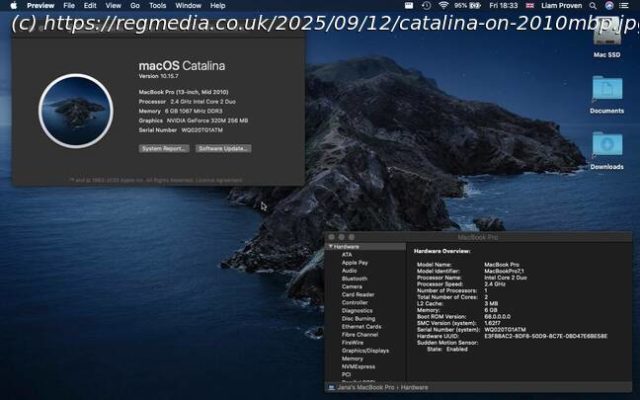Newer OSes for unsupported kit, and new browsers for older OSes. There’s always a way
Any day now, a new version of Apple’s macOS is due to launch, and it will exclude the bulk of the Intel-powered models the company has ever sold. However, there are multiple ways to breathe new life into Macs that go back as far as 10 or even 15 years.
The Reg FOSS desk has two older Intel Macs in daily use that can’t run any currently-supported version of macOS, though. Recently, we’ve been exploring our available options, and we’ve found that there are multiple potential routes to keep an old-time Mac productive.
macOS 26 «Tahoe» is due in a few days, and there are a whole four Intel Macs that will be able to run it: the 2019 MacBook Pro and Mac Pro, and the 2020 MacBook Pro and iMac. Those are the official models, anyway. As we covered back in 2023, the OpenCore Legacy Patcher project offers a free tool that lets you create a custom-modified macOS installer that will let you install newer versions of macOS onto Macs too old to officially support them. We reckon there’s a good chance that a future update to OCLP will make more older models able to run macOS 26.
«Tahoe» is officially the last-ever macOS for Intel hardware, though. The switch to Arm-based Apple Silicon processors is permanently closing the door on the «Hackintosh» world, and the world of Arm devices is so wildly heterogeneous that there’s basically zero prospect of running Arm macOS on anything else. That’s why there’s the special Armbian distro just to make the current Linux available on Arm kit.
Before we tried to upgrade one of our daily drivers with OCLP, though, we wanted to test drive upgrading to an unsupported macOS. To this end, we recently pulled a retired MacBook out of storage. It’s a 2010 13-inch MacBook Pro. The last supported macOS for this model is 10.13 «High Sierra», and the newest mainstream web browser for this is Firefox 115, which is the ESR release from 2023. When its successor Firefox 128 appeared, Mozilla said it would keep updating version 115 for as long as possible. As The Register reported last week, that currently means March 2026. To get to the subsequent Firefox ESR, we needed at least macOS 10.15 «Catalina».
That poses a slight snag. The 2010 MBP is the only Core 2 Duo machine we’ve encountered that refuses memory that’s faster than the 1066 MHz DDR3 SDRAM for which it’s specified. It wants at least one PC3-8500 SO-DIMM, and it won’t start with PC3-10600, let alone even faster. (We blame the Nvidia GeForce 320M GPU for this fussiness.) As a result, our MBP only has 6 GB of RAM. That’s a snag.
The current release of OCLP is version 2.4.1 and the oldest macOS it supports is macOS 11 «Big Sur». Officially, this will run in 4 GB, but we suspect it might be rather sluggish. However, OCLP doesn’t support Catalina.Enter the DOS dude
Help is at hand from Collin Mistr, AKA dosdude1. Among other apps, he offers a tool called macOS Catalina Patcher. It’s a just-over-200-MB download, although obviously you will need a copy of macOS Catalina as well. Apple has a helpful downloads page for every version from 10.7 to 15 (oddly, except 10.9 Mavericks, which was the first release the company distributed for free).
The «Install macOS Catalina.app» file is an 8.26 GB download, so we didn’t download a fresh copy: we copied it from our iMac onto a Mac-formatted USB key, and then onto the MBP. Then we downloaded Mistr’s patcher and ran it. (Unsurprisingly, this is not an authorized app, as it does something Apple doesn’t want to support, so don’t double-click it; right-click it and pick Open.






